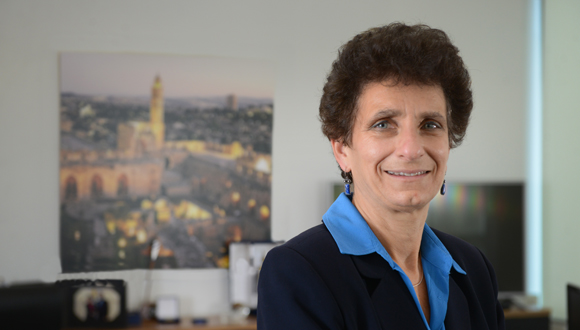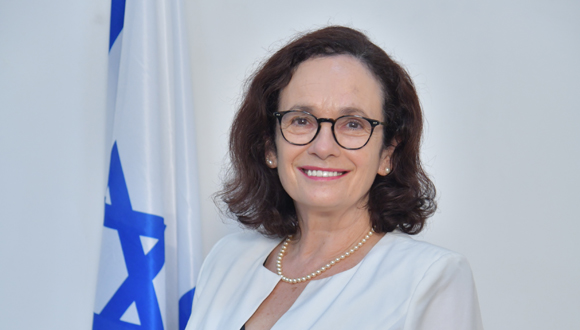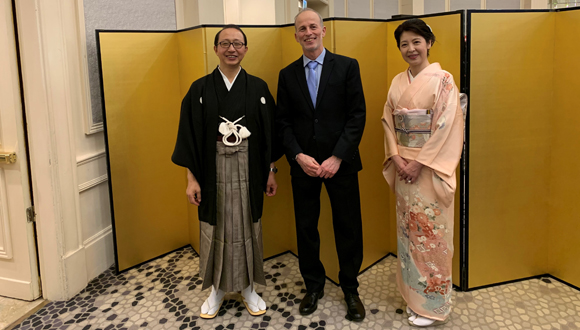
TAU Graduates Bolster Israel’s Global Standing
Written on | Alumni
Alumni in top diplomatic positions driven by a passion for Israel, share success stories from the field.
As a young girl growing up on a kibbutz, Galit Ronen wanted to change the world. At the time, she thought the way to do so was to become a geneticist: to learn how to feed the world and cure its diseases. This led her to TAU, where she earned bachelor’s and master’s degrees in biology. Today, she is Israel’s Ambassador to Argentina. Like Ronen, many TAU alumni serve Israel on the global frontlines as diplomats. They include Rony Yedidia-Clein, Deputy Head of Mission at Israel’s Embassy in India, and Ehud Eitam, Israel’s Consul General in Istanbul. All three see their alma mater as an important stepping stone in their careers.Diplomacy from the Heart
Ronen took a job with Israel’s Foreign Ministry more than 25 years ago, when she tired of her post-university research job. “I honestly think Israel is a miracle. Look at where we started,” she says. “It’s a country I believe in and I love its people.” As for her current posting, she says Israel and Argentina enjoy good relations. President Alberto Fernandez visited Israel one month after his inauguration in 2019, only the second time that a sitting Argentinian president made a state visit. In the context of that trip, he also attended the 75th anniversary ceremony of the liberation of Auschwitz—a meaningful statement. In addition, much of the meat that Israel consumes comes from Argentina. During the first COVID-19 lockdown in spring 2020, Ronen was instrumental in securing the entry of shohetim, Jewish ritual slaughterers, into Argentina, thus ensuring that Israelis had sufficient kosher meat for Passover. On the global stage, Ronen thinks that Israel is in a better place than it has been in previous years. She attributes this to Israel’s vaccination campaign—“the whole world wants to learn from us”—and the recent peace accords with Arab nations. Besides representing the country she loves, she enjoys the opportunity to reinvent herself every few years when she moves to a new assignment. “You have no friends or contacts; by virtue of your personality and what you represent, you have to start from zero and prove yourself.” The flip side, she says, is the loneliness. Though her training as a scientist is far behind her, she has fond memories of TAU. “Most of my best friends to this day are from my time at University,” says Ronen. They include Prof. Udi Gazit, Founding Director of the BLAVATNIK CENTER for Drug Discovery. She mentions Prof. emer. Eliora Ron, with whom she remains in close touch, as having influenced her in the academic and personal spheres. Galit Ronen (Photo: DEF)
Galit Ronen (Photo: DEF)
“Zionism is Not a Dirty Word”
Like Ronen, Rony Yedidia-Clein was attracted to the Foreign Ministry because of a deep love of Israel. “Some people think Zionism is a dirty word but it’s not,” she says. The daughter of Israelis raised in the US, she made aliyah at age 18 to join the army. She went on to complete an undergraduate degree in English literature at TAU, where, she says, she learned critical thinking and communication skills that serve her until today, while enjoying “Tel Aviv’s special vibe.” As Deputy Chief of Mission in India, Yedidia-Clein says she is proud of the robust relationship that has developed in the nearly 30 years since the two countries initiated diplomatic relations. This good relationship paid off during COVID-19. India provided emergency masks and equipment to Israel at the beginning of the outbreak, before Israel could produce enough for its own emergency staff. More recently, during the COVID-19 outbreaks in India this spring, the Embassy, in cooperation with Israeli government bodies, organized a massive airlift of aid supplies to the country’s hospitals and clinics, including ventilators, oxygen concentrators and medication, in an effort to save as many lives as possible. Aside from COVID-19, one of the Embassy’s main focuses now is a large-scale water project. Despite the fact that India possesses massive amounts of water, most of the population doesn’t have access to a clean, drinkable supply, Yedidia-Clein says. Through the Embassy, an Israeli expert will work with Indians to optimize use of this great resource. Though Yedidia-Clein has served as a diplomat in many countries, the achievement that stands out is her work coordinating Israel’s response to the massive earthquake in Turkey, where she was posted in 1999. “At three in the morning, I was woken up by the earth shattering and shaking.” Immediately, Israel sent civilian and military teams to help. “They used Israeli engineering ingenuity and chutzpah to get to places it should have been impossible to reach, such as taking a boat down a river because the roads weren’t accessible.” In addition to the many skills and “inner strengths” she has acquired throughout her career, Yedidia-Clein says that a diplomat’s most important quality is honesty. “It’s important to have people trust you and that means that you have to speak the truth,” she explains. “Israel is a country with problems like every other country in the world, whether we’re talking about migrant workers or our issues with the Palestinians or anything in between. The main thing is to show that we recognize our problems, and we’re doing our best to solve them.” Rony Yedidia-Clein
Rony Yedidia-Clein
At the Heart of Global Change
Ehud Eitam, Israel’s Consul General in Istanbul, another TAU graduate, boasts a diplomatic career of nearly 35 years. Prior to his current posting, he served as Israel’s Ambassador to Costa Rica and Peru, among other postings. Even after so much time, he still finds his job fascinating. “From the first stages on the job, you work directly with the top echelons of other countries,” he says. “You find yourself in the middle of huge and meaningful things.” He recalls when, during one of his postings, anti-Israel groups in Latin America attempted to prevent an Israeli company from winning a lucrative tender. The public pressure was so intense that Shimon Peres, then Foreign Minister, and Reuven Rivlin, Israel’s current President and then Communications Minister, got involved. The campaign culminated with Eitam appearing on a popular TV talk show, hosted by a local Palestinian. He knew that the interview would determine the campaign’s fate. Ultimately, the Israeli company won the tender, and Eitam views the episode as a tipping point in garnering more legitimacy for Israel in the region. One of his biggest achievements was during his first posting in Helsinki in the late 1980s. Finland had become a transit station for Jews flooding out of the Soviet Union, and, finding himself at a milestone of Jewish history, he became involved in many facets—economic, political, security and logistical. Eitam cites David Ben-Gurion who said that all diplomats wear two hats—as representatives of the State of Israel and of the Jewish community. “You have to make important practical decisions that could have wide-ranging consequences for the Jewish people as a whole.” Subsequently, Eitam established the Israeli Embassy in the Ukraine, one year after the country gained independence. He undertook the momentous task of building Israel’s ties with the country from scratch. His work there was especially significant because of the Ukraine’s rich and complicated past with the Jewish people; aliyah from the country was strong at the time, and Eitam facilitated and attended the first state visits between the countries’ leaders. After he’d been working in the field for nearly 20 years, Eitam returned to academia to complete a master’s degree in security and diplomacy at TAU. His studies allowed to him to gain insights on the vast experience he’d accrued, alongside other experienced professionals. He recalls courses with Profs. Nissan Oren and Azar Gat as well as Major Gen. (Ret.) Prof. Isaac Ben-Israel, which is an “experience in and of itself.” He was able to apply this knowledge in his subsequent positions. Eitam, Ronen and Yedidia-Clein are among thousands of TAU alumni who are members of TAU’s Alumni Organization, headed by Sigalit Ben Hayoun. The Organizaton’s goal is to leverage the influence of TAU alumni through shared knowledge and opportunities. And like Ronen and Yedidia-Clein, Eitam concludes that his main motivation to serve as a diplomat is Zionism. For Ronen, this same deep-rooted ideology means that he has fulfilled her childhood dream of tikkun olam. “I think representing Israel, changing one opinion at a time, is changing the world.”
Ehud Eitam with the Japanese Consul and his wife
By Melanie Takefman
Featured image: Rony Yedidia-Clein (center, in white) in Rishikesh, during the Indian holiday of Holi.
Ehud Eitam with the Japanese Consul and his wife
By Melanie Takefman
Featured image: Rony Yedidia-Clein (center, in white) in Rishikesh, during the Indian holiday of Holi.